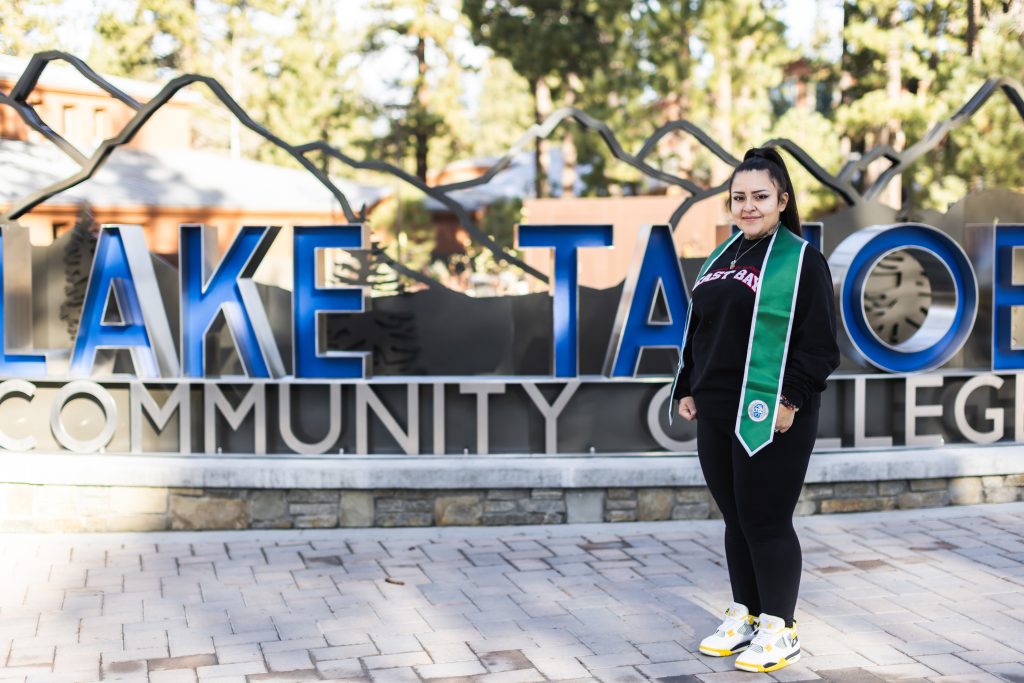Rising Scholars Network helps launch Lake Tahoe Community College Student on path to higher education and advocacy work

Lina Caro Flores’ teens and early 20s were marred by crime and addiction. She says she and her brother were in constant trouble, which eventually resulted in her serving a three-year stretch at Valley State Prison in Chowchilla. She was 21 when she was released, but remained stuck in a cycle of addiction, gangs and violence.
“The county jail had become a revolving door for me,” Flores says. “In 2017, I found out I was pregnant with my first son. He was the reason I got sober and decided to give myself a chance. Being a single mother, I struggled with being able to provide basic needs for my son and myself after a wage garnishment arose of $106,000 from when I went to prison. This garnishment made it practically impossible to be able to stabilize my life. I was tired of struggling.”
Flores started attending classes at Lake Tahoe Community College, where she heard about the Rising Scholars Network and—with help—was able to get herself on track. She says finding the program helped her become increasingly positive about the possibilities available to her.
“I have many friends who get stuck in the cycle of recidivism. It becomes so hard to break away from what is familiar when there are so many outside expectations for failure.”
Lina Caro Flores, Rising Scholar, Lake Tahoe Community College Graduate and California State University East Bay Student
The Rising Scholars Network helps students who’ve experienced the criminal justice system overcome barriers many of them face while trying to achieve academic and career success. The program is driven by Vision 2030, a strategic plan overseen by the California Community Colleges Chancellor’s Office to increase equity in education.
“My brother, who as of now does not have a date to parole, is a big motivation for me and why I wanted to get involved with the Rising Scholars,” she says. “For the first time since starting my college career, I felt at home with the Rising Scholars. In no time, I became a student worker for the program. I feel passionately about helping those who are currently and formerly incarcerated change their lives.”
Her position as a student worker with Rising Scholars led to her starting a new club at LTCC dedicated to supporting system-impacted students called RISE UP.
“We noticed that our community college didn’t have support for those who are dealing with the post incarceration and re-entry process,” Flores says. “This last year, RISE became my baby. I have seen it blossom from the ground up. I have many friends who get stuck in the cycle of recidivism. It becomes so hard to break away from what is familiar when there are so many outside expectations for failure.”
Flores graduated from LTCC last spring with a double major in psychology and sociology. She’s one class away from receiving her AA degree in English, and started attending Cal State East Bay in the fall of 2024, where she’s pursuing her bachelor’s degree in sociology.
“Through Rising Scholars, I was able to build lasting connections,” Flores says. “I am now also a part of Project Rebound [which supports the higher education and successful reintegration of formerly incarcerated individuals at California State Universities].”
Flores’ achievements keep stacking up. She sang the National Anthem at her graduation ceremony from LTCC, where she also received a certificate from California State Senator Marie Alvarado-Gil for her academic and community efforts, as well as other awards and scholarships.
She remains focused on helping other people also, actively advocating to end child poverty and for other causes. She currently works as a mentor with Encompass Youth, an organization that provides counseling, skills building, and supportive housing for youth ages 15–24 who are experiencing homelessness or have been in foster care or on probation.
“Just like with RISE, we are helping these teens navigate the criminal justice system and helping them cope with the struggles that come with post-incarceration and the re-entry process,” she says. “So many times, after incarceration, it seems like there is a target on the individual and an expectation to fail. I am here to help and make a difference, and stop the cycle of mass incarceration.”
For more info about the Rising Scholars Network, go to risingscholarsnetwork.org. To learn more about the California Community Colleges Chancellor’s Office and Vision 2030, visit www.cccco.edu/About-Us/Vision-2030.
Written by Brett Callwood
| Regions | Classes & Topics |
|---|---|
| Northern California | Justice-Involved |